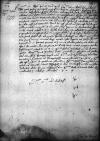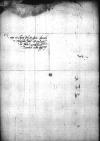Letter #218
Ioannes DANTISCUS to Piotr TOMICKIValladolid, 1524-10-03
Manuscript sources:
Auxiliary sources:
Prints:
| ||||||||||||||||||||||||
Text & apparatus & commentaryPlain textText & commentaryText & apparatus
Reverendissimo in Christo Patri et Domino,
Reverendissime in Christo Pater et Domine, domine gratiosissime, humillimam commendationem.
Ea, quae potui pro temporis angustia, maiestati regiae descripsi. Applicui
Ex
Reverendissimae Dominationis Vestrae deditissimus servus


 BNW BOZ 2053 nr 525 f. 161v
BNW BOZ 2053 nr 525 f. 161v